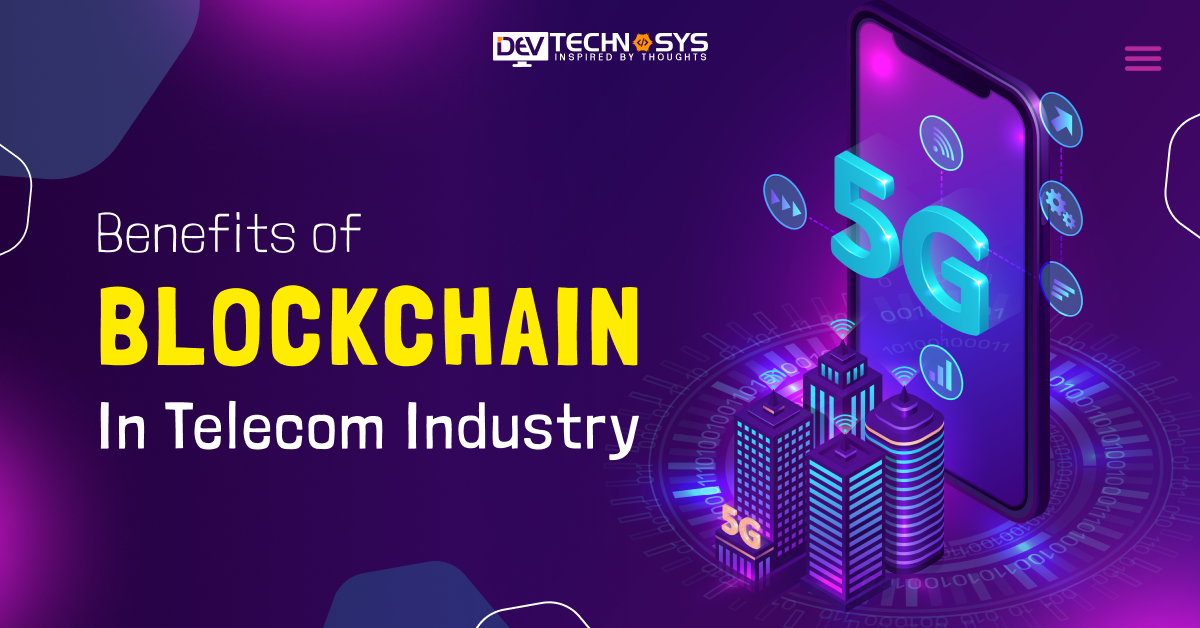The growing need for safe, effective, and transparent operations drives a significant transition in the telecom sector. By 2031, the worldwide telecom market is expected to grow to $2.65 trillion, and businesses are looking for cutting-edge solutions to improve workflows and lower fraud.
With a 2023 valuation of $17.57 billion, blockchain technology is changing the game by providing decentralized solutions that improve data security, automate billing, and stop revenue leaks. Telecom companies find it more difficult to manage complex networks and maintain regulatory compliance as 5G adoption speeds up and data consumption increases.
Blockchain for telecommunications is becoming increasingly popular in the industry because of its capacity to safeguard transactions, lower operating expenses, and enhance identity management. Blockchain is poised to revolutionize telecom operations, making them more reliable, economical, and efficient in the digital age, from smart contracts to fraud protection.
Market Stats on Blockchain Technology in Telecom Industry
- The global blockchain market in the telecom industry is expected to reach $25.2 billion by 2030, at a compound annual growth rate (CAGR) of 59.4% from 2024 to 2030.
- With notable acceptance in nations like China and India, the blockchain in telecom industry is predicted to expand in the Asia Pacific region from $0.77 billion in 2023 to $1.74 billion by 2033.
- As of 2023, more than 300 million individuals utilized enterprise blockchain in the telecom industry globally, demonstrating its growing adoption in various sectors, including telecoms.
- The estimate that global spending on blockchain solutions will exceed $19 billion by 2024 highlights the significant investments being made in blockchain technologies across sectors.
- By 2023, around 73% of US firms had either implemented or intended to implement blockchain technology, indicating a significant trend toward its incorporation into corporate processes.
- The size of the worldwide blockchain technology market was estimated at $17.57 billion in 2023 and is expected to increase at a compound annual growth rate (CAGR) of 52.8% to reach $825.93 billion by 2032.
How Does Blockchain For Telecommunications Work?
Blockchain uses its fundamental characteristics—transparency, immutability, and decentralization—to create a mobile app and function in the telecom sector. This is a condensed explanation:
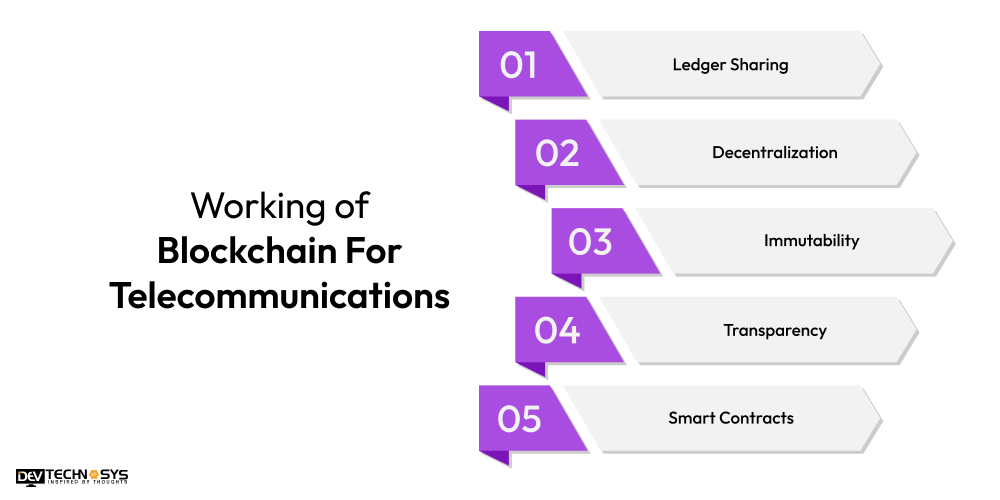
1. Ledger Sharing:
Consider a digital record book accessible to all telecom network users, including operators, clients, and devices. On this ledger, each event or transaction (such as a call, data use, or payment processing) is documented as a “block.”
2. Decentralization:
The ledger is spread over several computers, or “nodes” in the network, rather than being under the jurisdiction of a single central authority. This makes it more difficult to alter the records because most nodes would have to confirm any changes.
3. Immutability:
Once a block has been added to the chain, it is nearly impossible to change or remove it. This improves accountability and trust by guaranteeing a permanent and auditable record of every transaction.
4. Transparency:
The ledger is accessible to all participants, while certain information may be encrypted for privacy reasons. Since everyone can access the same information, this transparency promotes trust and lessens disagreements.
5. Smart Contracts:
Smart contracts are self-executing agreements encoded on the blockchain with predetermined rules. They provide efficiency and eliminate the need for middlemen by automating procedures like billing, roaming agreements, and service provisioning, making them a crucial component of blockchain app development services.
How it Applies to Telecom:
Security: By safeguarding private information and thwarting fraud, blockchain improves security.
Efficiency: Smart contract automation lowers expenses and streamlines processes.
Transparency: A shared ledger minimizes disagreements and promotes stakeholder trust.
Innovation: Blockchain makes new service offerings and business concepts possible.
Why Choose Blockchain Technology in Telecom Industry?
Beyond its particular applications, blockchain has clear benefits blockchain technology in telecom industry. In this section, we have covered reasons why you should choose blockchain in telecom industry:
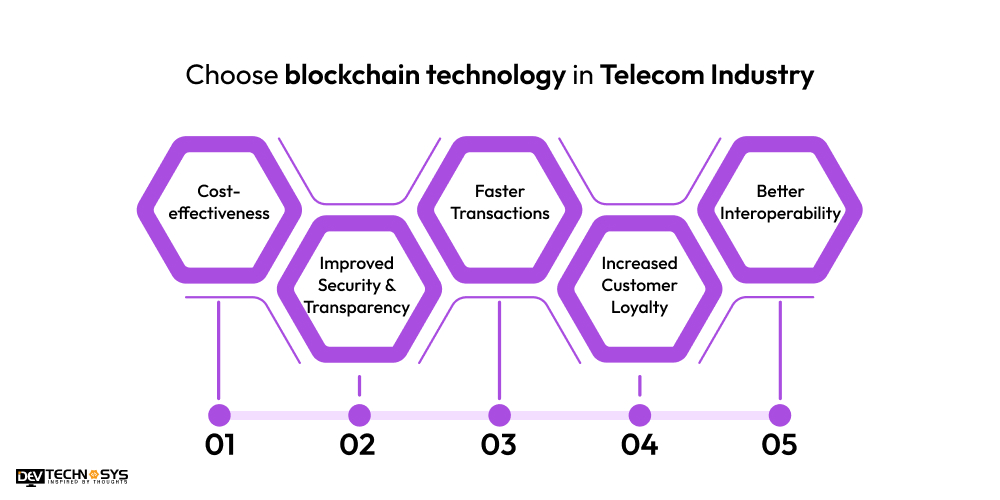
1. Cost-effectiveness:
Blockchain reduces operating expenses by automating fraud prevention and billing procedures, increasing profitability in a cutthroat industry.
2. Improved Security & Transparency:
Its unchangeable ledger strengthens data security, essential in a sector that handles private user data. This decreases susceptibility to cyber threats and fosters trust.
3. Faster Transactions:
Blockchain expedites transactions, making possible cross-border payments and real-time settlements. International collaborations and roaming services depend on this flexibility.
4. Increased Customer Loyalty:
Transparency and security foster stronger relationships, empowering customers. Loyalty programs built on blockchain further customize rewards, increasing retention.
5. Better Interoperability:
Blockchain for telecom makes integrating various telecom equipment and systems easier, which is essential for growing networks and providing cutting-edge services.
10 Blockchain Use Cases in Telecom
Blockchain is transforming the telecom industry, enhancing security, transparency, and efficiency. From fraud prevention to secure transactions, explore ten innovative use cases of blockchain in telecom operations and driving technological advancements.
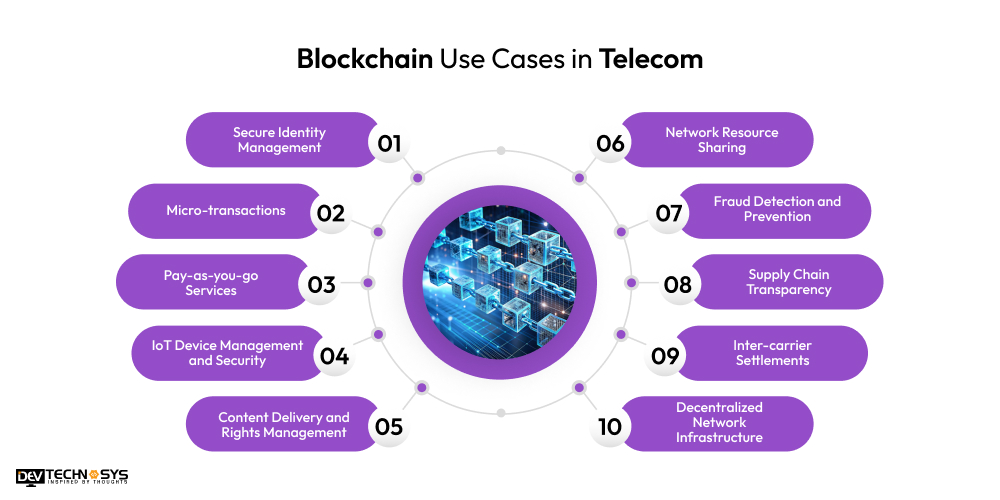
1. Decentralized Spectrum Management:
Blockchain in telecom industry can transform spectrum distribution by establishing an open and effective market. Dynamic spectrum access can be made possible in place of conventional auctions, enabling real-time trade and spectrum usage optimization.
Polygon blockchain development promotes innovation and competition in the market while guaranteeing the best possible use of available resources, which helps both larger and smaller telecoms. Customers might pay less, and a valuable resource could be used more effectively.
2. Secure Identity Management:
Telecom businesses can use blockchain technology to give their subscribers digital identities that are both secure and verified. Blockchain in the telecom industry will facilitate smooth roaming over several networks, streamline KYC (Know Your Customer) procedures, and lower fraud.
By giving rights only when required, users would have more control over their personal information, improving security and privacy. This simplifies service access by eliminating the requirement for numerous logins and passwords.
3. Micro-transactions and Pay-as-you-go Services:
Pay-as-you-go data plans and pricing for individual network slices are examples of new business models made possible by blockchain’s ability to enable granular billing and microtransactions.
Blockchain in the telecom industry enables telecoms to more efficiently monetize their network resources while giving consumers more choice and control over their spending. These transactions can be automated by smart contracts, guaranteeing transparency and cutting down on administrative work.
4. IoT Device Management and Security:
As the number of IoT devices grows, securing and managing them is essential. For telecom networks, blockchain can offer a safe device management, authentication, and registration platform.
By guaranteeing data integrity and device accountability, IoT developers improve the security of IoT networks and open up new applications in domains like smart homes and industrial automation.
5. Content Delivery and Rights Management:
Blockchain for telecom can safeguard intellectual property rights and control the distribution of digital material. Blockchain in the telecom industry gives customers access to a greater variety of content while enabling content creators to monetize their work directly. By ensuring transparent tracking of content usage and automating royalties, smart contracts can streamline the value chain and minimize disputes.
6. Network Resource Sharing:
Resource-sharing blockchain technology makes platforms possible, enabling individuals and companies to share their excess bandwidth or network capacity.
Bitcoin app development can increase network utilization and generate new revenue sources for network owners, especially in places with inadequate infrastructure. Smart contracts can guarantee equitable pay and streamline the sharing process.
7. Fraud Detection and Prevention:
Blockchain is a potent tool for fraud detection and prevention in the telecom sector because its immutable ledger makes it difficult to alter records. Telcos can safeguard themselves and their consumers by monitoring transactions and network activity on the blockchain to detect and stop fraudulent activities like SIM swapping, account takeover, and robocalls.
8. Supply Chain Transparency:
From production to deployment, telecom equipment’s origin and movement may be tracked using blockchain technology. This increases supply chain efficiency, guarantees equipment authenticity, and helps stop counterfeiting. Additionally, blockchain in supply chain management openness reduces downtime, improves network reliability, and aids in locating and fixing problems with malfunctioning equipment.
9. Roaming Agreements and Inter-carrier Settlements:
Blockchain technology can simplify and automate payments, lowering their complexity and expense. By automating payments and defining the parameters of these agreements, smart contracts can ensure transparency and lower the number of conflicts. Blockchain in the telecom industry facilitates international roaming and makes more adaptable pricing structures possible.
10. Decentralized Network Infrastructure:
With blockchain technology, decentralized telecom networks can be established that are more robust and impervious to censorship. Instead of being controlled by a single, centralized organization, these networks can be owned and run by a community of users.
A mobile app development company can leverage this technology to create innovative solutions, making telecom services more accessible and reasonably priced, especially in underprivileged areas.
The Impact of Blockchain Technology on Telecom Industry
Although the use cases demonstrate blockchain’s capabilities, its impact centers on how it alters the telecom environment. This is a summary of how Solana blockchain app development is influencing the industry.
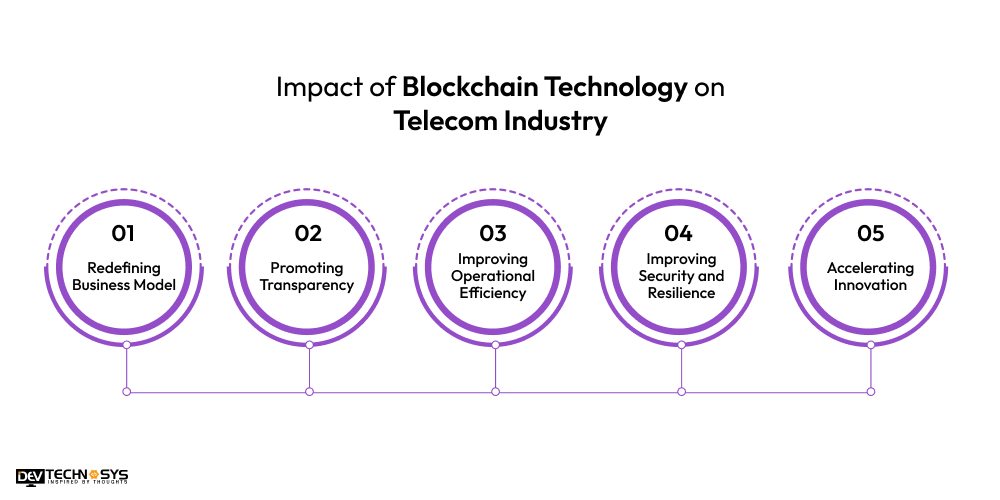
1. Redefining Business Models:
Blockchain opens up new revenue streams through decentralized services, data sharing, and micro transactions. This puts conventional pricing structures to the test and creates opportunities for cutting-edge service provision.
2. Promoting Transparency and Trust:
Private blockchain in telecom industry cultivates stakeholder trust through its unchangeable ledger. This improves customer confidence and inter-operator cooperation and is essential for data protection, safe transactions, transparent partnerships, and reliable IT consulting services.
3. Improving Operational Efficiency:
Smart contract automation simplifies supply chain management, roaming, and billing. This lowers expenses, cuts down on mistakes, and releases resources for creativity.
4. Improving Security and Resilience:
Private blockchain in the telecom industry is decentralized, and networks are more resilient to single points of failure and cyberattacks. In a world that is becoming more interconnected, this is essential for safeguarding private information and maintaining service continuity.
5. Accelerating Innovation:
Blockchain for telecommunications enables carriers to test out new services and technology by streamlining procedures and encouraging cooperation. This shapes the future of connection by spurring innovation in fields like edge computing, 5G, and the Internet of Things.
Future Trends of Blockchain Technology in Telecom Industry
Now that you know blockchain in telecom industry you must know about its future trends. In this section we have compiled of list of trends of telecom in future.
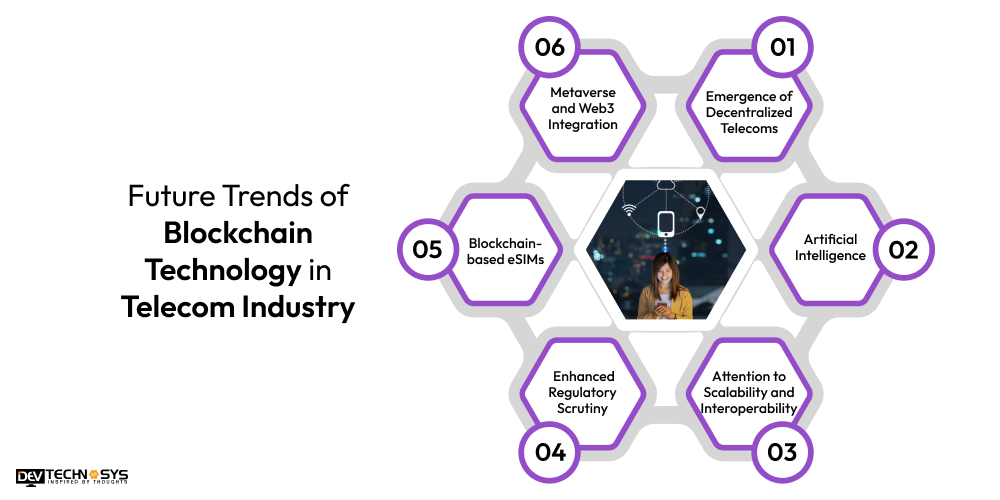
1. The Emergence of Decentralized Telecoms:
More networks run and owned by the community will use blockchain technology for governance and resource sharing. This has the potential to democratize connectivity, particularly in underdeveloped areas.
2. 5G and Edge Computing Driven by Blockchain:
As 5G and edge computing become more important, blockchain will be essential for controlling network slices, protecting data transmission, facilitating micro transactions for edge services, and providing blockchain help for small businesses in securing transactions and managing decentralized operations.
3. Artificial Intelligence:
The convergence of blockchain technology and artificial intelligence (AI) will allow for individualized service offerings, predictive maintenance, and intelligent network management. Blockchain data may be analyzed by AI to detect any security risks and improve network performance.
4. Pay Attention to Scalability and Interoperability:
The volume of transactions in telecom operations may be too much for current blockchain networks to handle. Blockchain applications in telecom industry that can manage high throughput and integrate seamlessly with current telecom infrastructure will be the main focus of future development.
5. Enhanced Regulatory Scrutiny:
As blockchain implementation in telecommunications increases, regulators will probably intervene to address concerns about consumer protection, security, and data privacy. As a result, best practices and industry standards will be developed.
6. Blockchain-based eSIMs:
Although embedded SIMs, or eSIMs, are already becoming more popular, blockchain technology, including private blockchain development, can improve their management and security. This will make managing subscriptions, roaming, and device activation easier.
7. Metaverse and Web3 Integration:
As the metaverse and Web3 develop, blockchain will play a crucial role in facilitating safe transactions, managing digital identities, and guaranteeing compatibility across decentralized apps and virtual worlds.
Blockchain in Telecom Industry Cost
The blockchain app development cost in the telecom industry varies based on factors like network size, security requirements, and transaction volume. Developing a blockchain-based telecom solution can range from $15,000 to $35,000, depending on complexity.
For small-scale applications like smart contracts for billing or fraud prevention, costs may be on the lower end. However, large-scale solutions, such as decentralized identity management or inter-carrier settlements, require higher investment due to advanced security, scalability, and compliance needs.
Additional costs include blockchain infrastructure, ongoing maintenance, and integration with existing telecom systems. Companies may also incur cost to hire blockchain developers, which can range from $10 to $15 per hour.
Despite the initial investment, blockchain enhances security, automates processes, and reduces fraud, making it a cost-effective solution in the long run for telecom businesses.
How Can Dev Technosys Help?
Blockchain in telecom industry has the potential to improve security, expedite processes, and open up new service opportunities. Its advantages are numerous, ranging from decentralized networks to safe identity management. If you’re looking to hire a blockchain app developer, we can help you create a unique blockchain platform that meets your particular telecom requirements.
We provide all-inclusive services that enable you to fully utilize blockchain technology for your company, from initial design and consultancy to development, implementation, and ongoing maintenance. To find out how we may assist you in building blockchain applications in the telecom industry.
Frequently Asked Questions
Q1: How Can Blockchain Enhance Telecommunications Security?
Because blockchain technology is encrypted and decentralized, it is very difficult for hackers to alter data. This lessens fraud and breaches by fortifying security against cyberattacks and safeguarding private client data.
Q2: Can Blockchain Really Cut Costs For Telecom Companies?
Indeed. Blockchain application in telecom industry drastically lowers operating expenses and does away with the need for middlemen by using smart contracts to automate tasks like supply chain management, roaming agreements, and billing.
Q3: What Cutting-Edge Telecom Services Is Blockchain Enabling?
Blockchain opens the door to new and creative offers by facilitating micro-transactions for pay-as-you-go services, decentralized spectrum management, secure IoT device management, and new content delivery models.
Q4: Is Blockchain Difficult To Integrate Into Existing Telecom Systems?
We have a team of skilled developers that may design unique blockchain solutions that smoothly interface with your current infrastructure, reducing interruption, even though integration calls for careful preparation.
Q5: How Can I Use Blockchain Technology For My Telecom Business With The Support of Dev Technosys?
For the telecom sector, Dev Technosys provides end-to-end blockchain development services. We assist you in creating, developing, and implementing unique blockchain solutions, ranging from decentralized network platforms to safe identity management systems. With our help, you can take advantage of blockchain’s advantages for increased security, productivity, and creativity.
